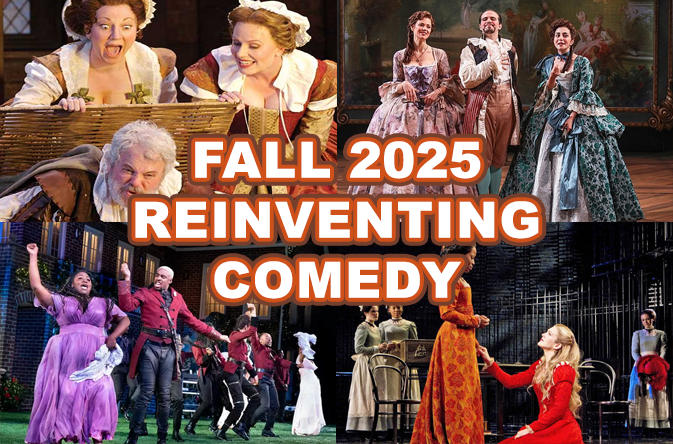
- This event has passed.
Fall 2025 – Reinventing Comedy

THE DUBUQUE SHAKESPEARE PROJECT
at the Carnegie Stout Library, Dubuque, IA
Fall 2025
REINVENTING COMEDY
Comedy to the modern audience induces laughter as opposed to drama that evokes thought and focuses on human pain. Aristotle considered characters in a comedy to be inferior versions of human beings so audiences can laugh at them. Shakespearean comedies are tales that often include pain and suffering and feature a range of characters who represent humanity in all its glory; their only unifying aspect is that they end with a restoration and continuance of societal order, usually with a marriage or two. In the period after his poetic masterpieces Romeo and Juliet, A Midsummer Night’s Dream and Richard II, Shakespeare’s genius was perfecting the history play while simultaneously pushing the boundaries of what a comedy could be. Even amidst plentiful laughter, we are forced to reckon with societal fault lines and ask hard questions about privilege and power.
We start our series with The Merry Wives of Windsor, a genial farce that toys with one of his greatest creations- Falstaff, the witty fat knight from Henry IV. Notably, it is the only full Shakespeare play to be set in contemporary England and features richly populated small town life full of smart wives, jealous husbands, and multiple suitors to a young maiden. From English small town shenanigans, we move to the fairy tale-like The Merchant of Venice. Or rather two fairy tales- the Venetian Jew who wants his pound of flesh and the Belmont lady who must be won by choosing the right one of the three caskets. Long considered a problem-play, productions and well as criticism has been dominated by the character of Shylock, a brilliantly realized villain who takes over the comic elements. The play has been used to justify and even glorify anti-Semitism and modern production often treat it as a tragedy. In our next play, Shakespeare invented the modern rom-com with Much Ado About Nothing; the Benedick-Beatrice hate-to-love banter is infused into every romantic comedy from It Happened One Night to Anyone But You. Misunderstandings abound with serious consequences, tragedy uneasily coexisting with comedy and the ‘happy ending’ purchased with pain. If the previous comedies featured great women like Katherina, Adriana, Portia and Beatrice, Shakespeare outdoes himself in one of his finest creations, Rosalind in As You Like It. There is a lightness to the play set in the idyllic forest of Arden, far from the courtroom treachery of the opening act. Romantic intrigue drives the busy plot, but it is the superbly-drawn characters that astonish and exhilarate.
Plays are available free online through:
https://shakespeare.folger.edu/shakespeares-works/
(Folger provides context for the plays in addition to providing full-text)
Suggested Print Edition: The Norton Shakespeare.
In addition, the library will have available books that provide analyses of Shakespeare’s plays and that place the plays’ plots and themes into a US/modern context.
Through their streaming movie service kanopy, library patrons also will have free access to 37 film versions of the plays that are part of BBC Television Shakespeare.
Additional Suggested Resources
Bloom, Harold. 1998. Shakespeare: The Invention of the Human. Riverhead Books
Garber, Marjorie. 2005. Shakespeare After All. Anchor.
Goddard, Harold C. 1960. The Meaning of Shakespeare. University of Chicago Press.
Hattaway, Micheal. 2003. The Cambridge Companion to Shakespeare’s History Plays. Cambridge University Press.
Schedule for Reinventing Comedy
Sep 14, 2025 The Merry Wives of Windsor
Oct 12, 2025 The Merchant of Venice
Nov 9, 2025 Much Ado About Nothing
Dec 14, 2025 As You Like It
